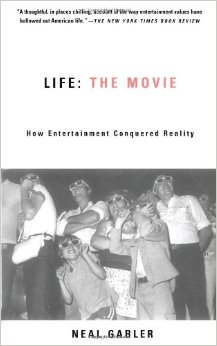



Life: The Movie: How Entertainment Conquered Reality Paperback – February 29, 2000
Frequently Bought Together
Customers Who Bought This Item Also Bought
|
Start reading Life: The Movie: How Entertainment Conquered Reality on your Kindle in under a minute.
Don't have a Kindle? Get your Kindle here, or download a FREE Kindle Reading App. | |
Product Details
Would you like to update product info or give feedback on images?.
|
Editorial Reviews
Amazon.com Review
The scope of Gabler's investigation extends far beyond the movies to publishing, television news, paint brands, fashion--anything that seems to have been transformed by the national passion for low-brow entertainment. Along the way, Gabler raises a series of intriguing questions: Why do some people feel more passionately about celebrities than about their own loved ones? Why is Donald Trump a celebrity? Why was the broadcast of the 1996 Olympics packed with so many biopics that the sporting events seemed afterthoughts? Why does Ralph Lauren call the blue paint he sells "Lap Pool Blue"?
Movies promote the fantasy that there are simple narrative solutions for all of life's problems. Movies are full of sex, scandal, gossip, and action. If our lives were movies, they would be more full of what Zsa Zsa Gabor once called "enchanting make-believe." In this book, Gabler demonstrates how this fantasy has shaped our society. --Jill Marquis --This text refers to an out of print or unavailable edition of this title.
From Publishers Weekly
Copyright 1998 Reed Business Information, Inc. --This text refers to an out of print or unavailable edition of this title.
More About the Author
Customer Reviews
Most Helpful Customer Reviews
Parts of the book are priceless. One should read it with a highlighter or a pencil and capture the more descriptive gems for future attribution. As an example, describing the propensity of '80's and `90's middle class Americans to videotape family events:
"Weddings, baby showers, bar mitzvahs . . . even surgeries, all of which had traditionally been undramatic, if occasionally unruly, affairs, were now frequently reconfigured as shows for the video camera complete with narratives and entertaining set pieces throughout. Sometimes a hastily edited version of the tape, complete with musical soundtrack and effects added to boost its entertainment value higher still, would be shown at the climax of the occasion as if the entire purpose of the celebration had really been to tape it."
One senses that Gabler, taking leads from Marshall McLuhan, Neil Postman, Richard Schickel . . . even Andy Warhol, is on to something very big, if not overarching. Gabler deals with the subject in a mere 244 easily read pages, but I was left wanting more and feeling that the subject had been dealt with somewhat superficially. Nevertheless, I enjoyed the book and would recommend it to anyone who can stand to add to their level of cynicism.
Some might say Gabler overstates his case. Have we really become so infused with "lifies" projected at us on a billion screens that we no longer know where we begin and where we end? Compared to the post-mods who can't resist hyperbole and grand gestures, though, he grounds his case historically, culturally and economically. Moving from a quick periodization of the rise of mass entertainment in the U.S. in conjunction with Jacksonian era during which elitist amusements were challanged and overthrown -- in 1849 29 b'hoys in NYC were killed during a riot where protested the English actor MacCready's reading of Shakepeare as a disparagement of the American style of Edwin Forrest -- he shows how entertainment has always been contested terrain.Read more ›
Gabler begins with a definition of what entertainment is: as opposed to the high art tradition, which requires elite education and effort to "get" it (e.g. to "properly appreciate" Opera), entertainment emerged as a democratic impulse soon after the beginning of the 19th century. Rather than high brow fare for esthetes, entertainment brought an immediate sensation of pleasure to the masses and a sense of losing oneself in a story without preparation. WIth the development of technology, Gabler continues, entertainment entered the news, particularly as images, but also as exciting stories, first in the penny press and then in film and finally TV. The penny press brought news to the masses at a price it could afford, largely replacing the elitist partisan editorials that cost 5 times as much in Jefferson's day. The trick was finding the right hook for less educated audiences, to get them into a narrative with which they could identify personally. This history is told in splendid detail, in a well spring of ideas that makes the reader (or at least me) want to research a lot more into this.
From popular culture, Gabler then argues that the need for entertainment created a kind of bizarre feedback loop, according to which it must be manufactured, even when it does not exist. That means that reality is made to fit the story, not the other way round. This leads not only directly to celebrity - those who are famous for being famous more than for having accomplished anything, e.g.Read more ›













